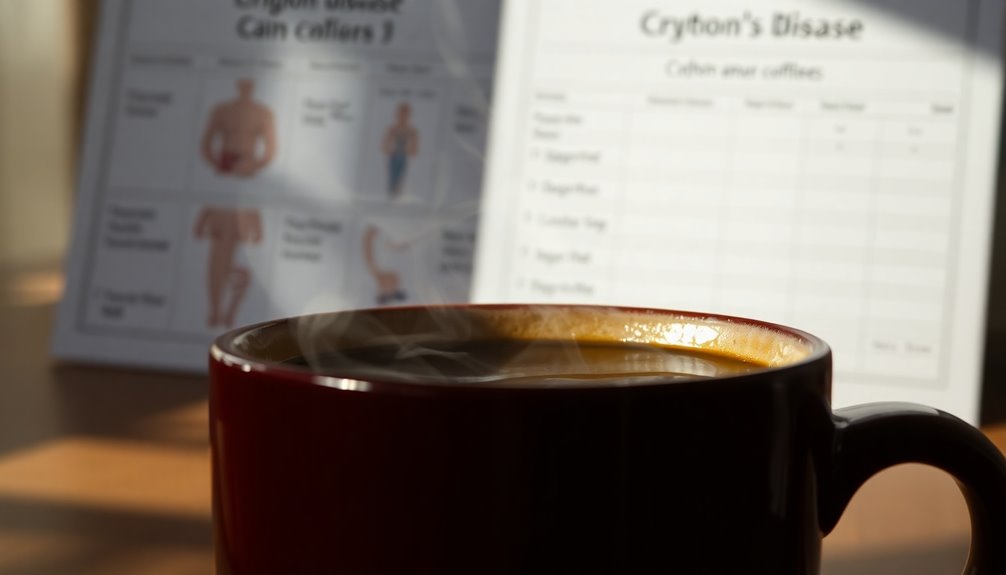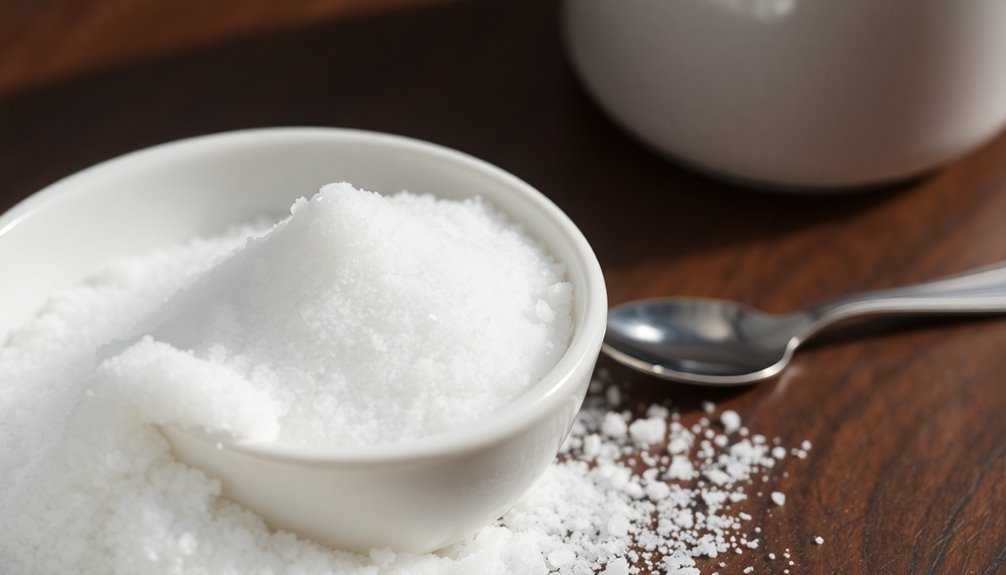Coffee's impact on Crohn's disease and colitis varies from person to person. About 49% of individuals find it triggers uncomfortable symptoms like diarrhea or abdominal pain. However, coffee might also offer benefits, such as lowering inflammation markers and reducing colorectal cancer risk. If you enjoy coffee, switching to decaf or drinking it with meals can help minimize discomfort. Monitoring your coffee intake is essential, as personal tolerance varies widely. Keep a symptom journal to identify how coffee affects you specifically, and there's even more to explore about managing these conditions effectively.
Key Takeaways
- Coffee may lower inflammation markers and colorectal cancer risk, potentially benefiting individuals with Crohn's disease and colitis.
- Approximately 49% of IBD patients report coffee as a trigger for symptoms like abdominal pain and diarrhea.
- Individual reactions to coffee vary; personal symptom monitoring is essential to identify triggers and manage IBD effectively.
- Switching to decaffeinated or low-acid coffee and consuming it post-meals can reduce gastrointestinal discomfort for some patients.
- Keeping a food diary and consulting healthcare providers can help tailor coffee consumption to individual needs and enhance symptom management.
Coffee's Inflammatory Effects

When considering coffee’s effects on inflammation, it’s important to highlight that research suggests it doesn’t increase inflammation markers in your body. Furthermore, some studies indicate that coffee may even have anti-inflammatory properties, potentially providing a protective effect against chronic diseases. This adds to the growing body of evidence exploring coffee’s effects on heart health, as reduced inflammation is closely linked to improved cardiovascular outcomes. As a result, incorporating coffee into a balanced diet might offer benefits not only for inflammation but also for overall heart wellness.
For those with inflammatory bowel disease (IBD) like Crohn’s disease and ulcerative colitis, this is good news. Studies indicate that coffee may even lower the risk of certain cancers, including colorectal cancer, which is especially relevant for IBD patients. Additionally, the antioxidants found in coffee could help reduce inflammation, which is crucial for individuals managing IBD. While the benefits of coffee extend to various aspects of health, it’s also essential to consider the coffee effects on oral health, as excessive consumption can contribute to tooth erosion and other dental issues. Moderation is key, allowing IBD patients to enjoy the potential benefits of coffee while maintaining their overall wellness.
Additionally, coffee consumption is linked to better liver health, potentially reducing risks of liver diseases. It may also help decrease the risk of type 2 diabetes, a concern for those with IBD.
While caffeine intake varies, the evidence shows that coffee doesn't exacerbate your symptoms or trigger inflammation, allowing you to enjoy it without worry. Furthermore, incorporating a low carb diet can complement the health benefits of coffee by promoting overall wellness for individuals with IBD.
Coffee as a Trigger

For many with Crohn's disease and colitis, coffee can trigger uncomfortable symptoms, but the impact varies from person to person.
You might find that while some people experience flare-ups, others can enjoy coffee without issue.
Keeping track of your reactions can help you determine how coffee affects your condition and guide your consumption choices.
Individual Tolerance Variations
Although many individuals with Crohn's disease and ulcerative colitis report that coffee triggers gastrointestinal symptoms, the extent of this reaction varies considerably from person to person.
Your individual tolerance to coffee can greatly impact how it affects you. It's important to pay attention to your body's responses:
- Monitor your responses to coffee over time.
- Keep a food and symptom diary to identify patterns.
- Notice how timing affects symptom severity, especially if you drink coffee on an empty stomach.
With about 49% of those who see coffee as a trigger still consuming it, understanding your unique tolerance is vital.
This awareness can help you manage your symptoms more effectively and make informed choices about coffee consumption.
Common Symptoms Triggered
While many people enjoy their daily cup of coffee, it can trigger a range of uncomfortable symptoms for those with Crohn's disease and ulcerative colitis.
You'll find that coffee often leads to abdominal pain and diarrhea, making it a common trigger for flare-ups. Approximately 49% of patients identify coffee as a culprit but still choose to consume it, highlighting the varied responses individuals experience.
Some may tolerate coffee without issues, while others might find their symptoms exacerbated. Research shows caffeine can increase gastrointestinal motility, but the exact connection between coffee and worsening IBD symptoms is still unclear.
Keeping a food and symptom journal can help you pinpoint if coffee is a trigger for your gastrointestinal discomfort.
Recommendations for Consumption
Managing coffee consumption is key for individuals with Crohn's disease and ulcerative colitis, especially considering its potential to trigger symptoms.
To help you navigate your coffee habits, here are some recommendations:
- Switch to decaffeinated coffee to reduce irritation.
- Consume coffee after meals to minimize discomfort.
- Dilute your coffee with milk or non-dairy alternatives.
Everyone's response to coffee varies, so it's essential to assess how it affects you personally.
Keeping a food and symptom journal can help you track triggers linked to coffee consumption. Additionally, consulting a healthcare professional can provide tailored guidance, allowing you to enjoy coffee mindfully while managing your Crohn's or colitis symptoms effectively.
Improving Coffee Tolerance

If you're looking to improve your coffee tolerance, consider switching to decaffeinated options to minimize gastrointestinal triggers.
You might also find that enjoying your coffee after meals, along with adding milk or non-dairy alternatives, can help reduce discomfort.
Keeping a food and symptom journal can further guide you in identifying what works best for your body.
Decaffeinated Coffee Alternatives
Decaffeinated coffee alternatives can be a game-changer for those with Crohn's disease or ulcerative colitis. By choosing decaffeinated options, you can reduce potential gastrointestinal triggers and manage IBD symptoms more effectively.
Here are some tips to improve your coffee experience:
- Opt for low-acid varieties of decaffeinated coffee to minimize digestive issues.
- Add milk or non-dairy alternatives to dilute effects and ease digestion.
- Enjoy decaffeinated coffee after meals to buffer its impact and reduce gastrointestinal discomfort.
Gradually decrease your caffeine intake while monitoring how your body reacts. This way, you can savor the taste of coffee without aggravating trigger symptoms, allowing you to enjoy your favorite beverage while better managing Crohn's disease or ulcerative colitis.
Meal Timing Strategies
Understanding how meal timing affects your coffee tolerance can considerably influence your overall well-being when living with Crohn's disease or ulcerative colitis.
Consuming coffee after meals may improve tolerance and reduce gastrointestinal symptoms for many individuals. You might also find that adding milk or non-dairy alternatives helps dilute coffee's effects, making it easier to handle.
If caffeine triggers issues, switching to decaf coffee allows you to enjoy a warm beverage without the jitters.
Remember, individual responses to coffee consumption can vary notably, so it's crucial to monitor how your body reacts.
Adjusting your meal timing and preparation methods can lead to a more comfortable experience with coffee while managing your symptoms effectively.
Dairy and Sugar Modifications
When it comes to improving your coffee tolerance with Crohn's disease or colitis, modifying your dairy and sugar intake can make a significant difference.
Here are some strategies to evaluate:
- Use lactose-free or fat-free milk to minimize gastrointestinal discomfort.
- Cut down on sugar; try date sugar or simply reduce your overall sugar intake to help alleviate symptoms.
- Opt for decaffeinated coffee to enjoy your favorite beverage without the stimulating effects of caffeine.
Additionally, drinking coffee after meals rather than on an empty stomach can further improve your tolerance.
Safe Coffee Consumption

Although coffee can be enjoyed by many individuals with Crohn's disease and ulcerative colitis, it's important to recognize that personal tolerance levels can vary widely.
Some people find that switching to decaffeinated coffee reduces gastrointestinal triggers associated with regular coffee consumption. If you're sensitive, consider consuming coffee after meals; this might enhance your tolerance and reduce symptoms.
Adding milk or non-dairy alternatives can also help dilute coffee's effects, potentially minimizing discomfort. Keeping a food diary to track your coffee intake and related symptoms can be beneficial for identifying personal triggers.
Ultimately, understanding your own body's responses will help you manage coffee consumption safely while enjoying its benefits.
Caffeine and IBD Overview

How does caffeine influence your experience with inflammatory bowel disease (IBD)? For many dealing with Crohn's disease and ulcerative colitis (UC), caffeine's effects can vary widely. Some might find relief, while others notice exacerbated symptoms.
Consider these points:
- Caffeine can increase gastrointestinal motility, which may lead to diarrhea in sensitive individuals.
- Clinical guidelines often recommend avoiding caffeine due to mixed evidence regarding its impact on IBD symptoms.
- Keeping a food and symptom journal can help you track your unique responses to caffeine.
Understanding your body's signals is essential. By monitoring your caffeine intake and its effects, you can make informed choices about your diet and manage your IBD symptoms effectively.
Member Experiences With Coffee

What do your peers say about their experiences with coffee while managing Crohn's disease and ulcerative colitis? Coffee consumption can be a mixed bag. Some find it triggers symptoms in people, while others report digestive relief. Tolerance to coffee varies; some enjoy regular brews, while others opt for low-acid or cold brew options. Timing also plays a significant role—what works one day might not the next. Many keep a food and symptom journal to track personal triggers associated with coffee intake. Overall, moderation in coffee consumption is key to managing IBD symptoms effectively.
| Experience Type | Trigger Symptoms | Recommendations |
|---|---|---|
| Positive | Rarely triggers | Monitor intake closely |
| Neutral | Sometimes triggers | Try low-acid options |
| Negative | Often triggers | Limit or avoid altogether |
| Individualized | Varies | Keep a symptom journal |
Dietary Recommendations and Alternatives

Many individuals with Crohn's disease and ulcerative colitis seek dietary recommendations that help manage their symptoms better. Here are a few alternatives to take into account:
- Opt for low-acid coffee or decaffeinated options to reduce flare-ups.
- Incorporate herbal teas, which may offer anti-inflammatory benefits.
- Keep a food diary to identify specific trigger beverages, including coffee consumption.
Staying hydrated with clear liquids and non-caffeinated drinks is essential. Air purifiers can also help improve indoor air quality, which may contribute to overall health.
Consulting your healthcare provider for personalized dietary recommendations can enhance your overall health and support symptom management.
Frequently Asked Questions
Does Coffee Aggravate Crohn's Disease?
When it comes to coffee and Crohn's disease, it can be a tricky subject.
You might notice that coffee triggers your symptoms, while others may not experience the same reaction.
If you find coffee aggravates your condition, it's wise to moderate your intake or try having it after meals.
Keeping a food diary can help you track your symptoms and identify what works best for you, ensuring you manage your condition effectively.
How Does Caffeine Affect Colitis?
Caffeine affects colitis differently for everyone.
You might find that it triggers flare-ups, causing increased gastrointestinal motility and potential diarrhea.
Alternatively, some individuals report no adverse effects and even symptom relief from caffeine.
It's important to monitor your reactions closely, as your body may respond uniquely.
If you notice worsening symptoms, consider switching to decaffeinated coffee or herbal teas to help minimize risks and maintain better digestive health.
Is Coffee Bad for Gut Inflammation?
Think of your gut as a delicate orchestra; coffee can strike a few discordant notes.
While it isn't universally bad for gut inflammation, its effects can vary. Some folks might feel fine after a cup, while others might experience a symphony of discomfort.
You should pay attention to your body's signals and consider keeping a food diary.
It'll help you discover how coffee plays into your unique gut composition and overall well-being.
Can Coffee Trigger Inflammation?
You might wonder if coffee can trigger inflammation. Research shows it doesn't greatly raise inflammation markers like C-reactive protein.
However, individual responses can vary. Some people notice gastrointestinal symptoms after drinking coffee, while others don't experience any issues at all.
It's important to pay attention to your body's reactions. Keeping a food diary can help you track whether coffee affects you personally, so you can make more informed choices.
Conclusion
To sum up, while coffee can trigger symptoms for some with Crohn's disease and colitis, not everyone is affected the same way. Curiously, studies show that about 30% of individuals with inflammatory bowel disease report that caffeine worsens their symptoms. If you're a coffee lover, experimenting with your tolerance and finding safe consumption methods can help you enjoy your brew while managing your condition. Always consult your healthcare provider for personalized advice tailored to your needs.









